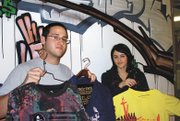Agenda Showroom
Friday, October 29, 2004
The typically spotless white walls of the California Market Center in Los Angeles burst into vibrant, anarchic murals of purple flowers, vines and paint splatters at the Agenda Showroom. It’s the first clue that Aaron Levant, partner in Agenda, is focusing on providing an alternative space.
Agenda represents eight independent, high-end streetwear lines: Los Angeles–based Grn Apple Tree, Leche and Scifen; New York–based Name Value, Gimme and Square; Australiabased Arkive; and Bali-based Deeper Shades of Soul. Levant said his clients churn together a mishmash of styles, such as urban and skateboard looks, on their quest to make a T-shirt, a hooded sweat shirt or a pair of jeans a work of art. Wholesale price points range from $14 for an Arkive T-shirt to $600 for a leather jacket from Deeper Shades of Soul.
Levant and his partner, Luis Pulido, opened the 5,000-square-foot showroom in May 2004 after producing the Agenda streetwear trade show for more than a year. Because many of the vendors at the trade show had no sales representation, the partners considered the showroom to be the next step in building their business.
Their plans have been ambitious. Since September 2003, they have been partnering with magazines, including Vapors and Beautiful Decay, to publish Agenda, a biannual trade magazine for the streetwear industry. The 48-page publication features interviews with designers and retailers and has a print run of 5,000. Levant hopes to publish 10,000 copies for the January 2005 issue.
The partners now hold six trade shows each year: two in Tokyo, two at the California Market Center and two in San Diego. They also plan to open an Agenda retail store in Westlake, Calif., in late 2005. Profits from the trade show fund all of their ventures.
Agenda employs 10 people. In August, Levant’s cousin, Seth Haber, a former mutual funds manager, was hired as chief financial officer.
Levant said he would like to run his company like a media conglomerate to own all methods of distribution. But there’s another reason, too. “This is such a tightly niched market. You need a couple of things going to be successful,” he said. —Andrew Asch
